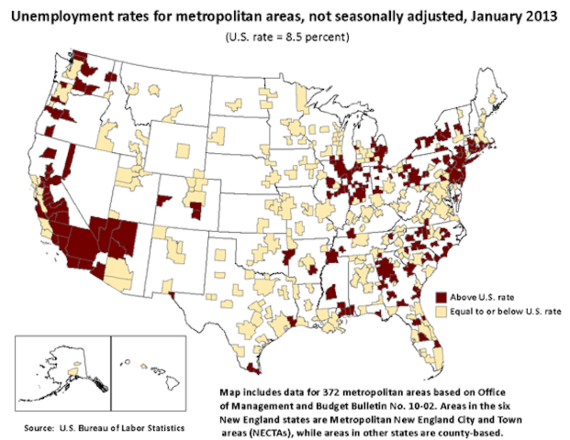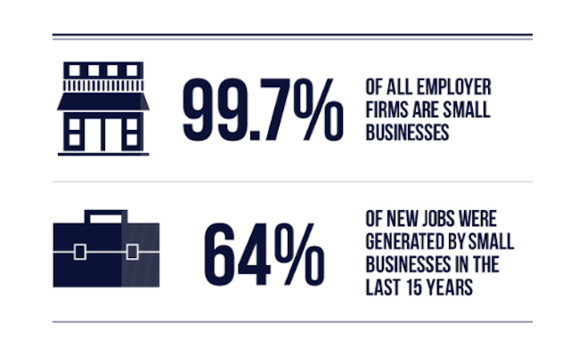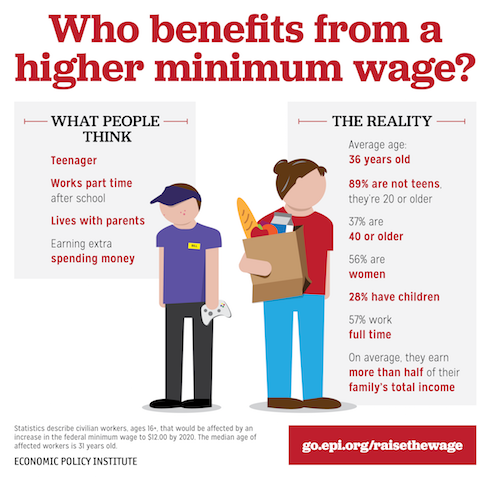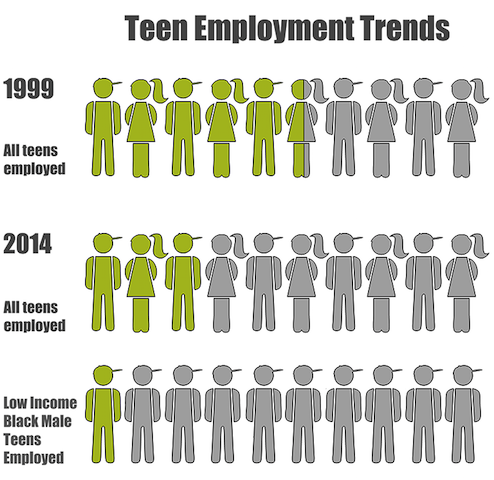California, New York and now Washington D.C. are passing laws requiring small businesses to pay a minimum wage of $15 per hour. These laws are an attempt to provide an increased wage to workers, but at what cost? Some evidence suggests that these changes will mean disaster for the very people such they are trying to help: the young working poor. Meanwhile our economy is burdened with $19 trillion in federal debt, an incomprehensible tax code, unsustainable trade agreements and 80,000 pages of business regulation, all of which result in economic stagnation and slow growth of wages.
Unemployment continues to plague American towns and cities (source)
Today, 24 million small business are operating in America. They account for almost half of our country's GNP. These businesses created 64% of our new jobs over the last 15 years, and are responsible for over half of our patents. They pay a remarkable one-third of all local, state, and federal taxes. In every corner of society, entrepreneurs are creating opportunity for American workers.
More than the astounding statistical punch of America's small businesses, they are the soul of the towns and cities that criss-cross our country; the brave and dedicated entrepreneurs who risk everything for these businesses, the driving force of many local economies. Despite that fact, most startups--several million--go out of business every year. One main reason so many businesses fail is that the market will not support a good or service that does not benefit the consumer. That is simple fact and, many would claim, the inherent justice of the market economy.
Learn more about entrepreneurship's formidable footprint here
But another reason for failure exists--and that is the systemic burden many countries impose on entrepreneurs in the form of regulations. From the onerous 79,000 pages of tax code and the massive regulations a business owner must navigate, this system often steals a business' first breath before most consumers even know it exists. Today, more regulations are hitting the entrepreneur than ever before, including higher minimum wage laws passing around the country.
In a free market, wages--the cost of labor--are determined by supply and demand. During times of slow growth or economic contraction, there is fewer opportunity for both entrepreneurs or workers. There are fewer jobs: a labor market with a greater number of job-seekers and opportunities, driving down competitive rates of compensation. Conversely, in a growing economy millions of jobs are created, supply wanes and workers demand higher wages as businesses compete for workers.
Demand correlates to how much a consumer will purchase of a product or service. Supply represents what is being offered. (source)
When a regulatory entity--such as the government--requires a minimum wage, something very different occurs. In markets with a greater supply of workers than demand, businesses will begin to layoff all the employees being paid at rates lower than the minimum wage. Take for example, California, where new regulations dictate a $15/hour minimum wage. California small businesses will be forced to make a difficult--in many cases impossible--decision: pay hundreds or thousands more in monthly labor costs and risk going out of business, or eliminate jobs to keep costs low. Other strategies also come into play. Factories will invest in machinery to replace human labor. Companies will begin to hire short contract labor or even hire off their books--something that is not only a crime but also robs the tax base and sets a poor example in the community. And companies will think twice about hiring employees who have unique workplace issues.
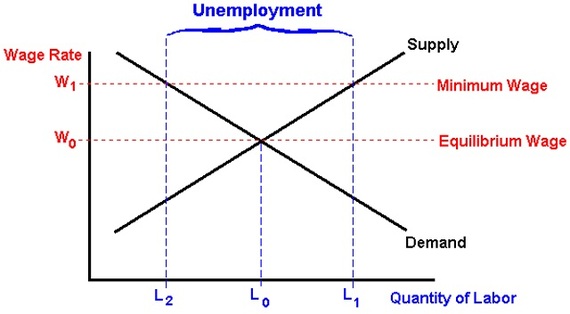
As the supply of labor increases beyond the demand, even fewer jobs exist above the natural wage rate. (source)
So who benefits from wage regulations? Not large businesses who must find new and creative ways to ensure profitability (think: moving operations overseas, contracting a firm to handle all of customer service out-of-house). And not small business owners, who are already burdened by the government regulations we mentioned earlier. While large companies have the resources to hire out-of-house or negotiate with unions when their hourly workers demand a new wage, small businesses simply do not have the cash reserve to pay the increased wage. As is almost always the case, the small business owner will shrink operations so that she can perform more of the work herself. That doesn't sound so bad when you look at one or two businesses, but an entire nation of small business owners retreating and shrinking their operations also slows innovations and improvements, which shrinks the economy further.
Teenage workers, including those with economic hardship, do not benefit from an increased minimum wage (source)
Some argue that the beneficiary to raised minimum wages is the worker--and in many cases, the black or latino kid, the single parent. After all, it is incredibly distressing to earn just $8/hour, even more so if you are supporting a child--distressing to a person's financial power as well as to his or her spirit. This wage keeps most workers living in poverty--especially those supporting a child or disabled relative. But Sadly the question becomes: is a young person better off in a world of $15-minimum wages when she is unemployed?
My own work has shown me over and over again the answer is no: entrepreneurship education helps low-income students increase their odds at success in the future by teaching them business skills today. Perhaps a better long-term solution than raising the minimum wage is to make it easier for young people to start their own businesses? Why deny those kids the opportunity for an autonomous job that is more satisfying than those at the minimum wage?
(source)
A better option would be to let wages settle at market value, while providing the education and resources adequate to helping students earn basic entrepreneurial skills, recognition in the community, and a better chance at a fulfilling career. When government policy encourages a competitive educational system that would encourage the teaching of entrepreneurial and ownership skills, along with a simple tax code that encourages business startups, our youth will have better options, more chance for success, and greater access to secure economic trajectories.
Perhaps the guiding principle of a nation's employment policy should be to help every citizen find and hone their comparative advantage--be it an insight or ability--and to make it simple for every citizen to turn that advantage into an income-generating niche--be it as an entrepreneur, an employee, or an owner; and empower every citizen to be an actor in the market.

